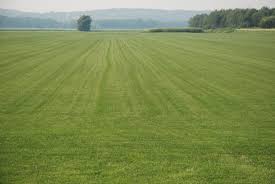land
英 [lænd]
美 [lænd]
- n. 国土;陆地;地面
- vt. 使…登陆;使…陷于;将…卸下
- vi. 登陆;到达
- n. (Land)人名;(英、德、葡、瑞典)兰德
使用频率:

记忆方法
为了记忆单词“land”,可以将它与“land on”这个短语相结合来形成一个场景:想象一个飞机(或任何物体)平稳地“land on”地面。这样,“land”这个单词就与“着陆”或“到达地面”的概念联系起来,帮助记忆。
以上内容由AI生成, 仅供参考和借鉴
中文词源
land 陆地,土地
来自PIE*landh,土地,荒野,词源同lawn.
英语词源
- land
-
land: [OE] Land goes back to a prehistoric Germanic *landam. This seems originally to have meant ‘particular (enclosed) area’ (ancestor of the modern sense ‘nation’), but in due course it branched out to ‘solid surface of the earth in general’. The term is now common to all the Germanic languages, and it has distant relatives in Welsh llan ‘enclosure, church’ and Breton lann ‘heath’ (source of French lande ‘heath, moor’, from which English gets lawn).
=> lawn - land (n.)
- Old English land, lond, "ground, soil," also "definite portion of the earth's surface, home region of a person or a people, territory marked by political boundaries," from Proto-Germanic *landom (cognates: Old Norse, Old Frisian Dutch, Gothic land, German Land), from PIE *lendh- "land, heath" (cognates: Old Irish land, Middle Welsh llan "an open space," Welsh llan "enclosure, church," Breton lann "heath," source of French lande; Old Church Slavonic ledina "waste land, heath," Czech lada "fallow land").
Etymological evidence and Gothic use indicates the original sense was "a definite portion of the earth's surface owned by an individual or home of a nation." Meaning early extended to "solid surface of the earth," which had been the sense of the root of Modern English earth. Original sense of land in English is now mostly found under country. To take the lay of the land is a nautical expression. In the American English exclamation land's sakes (1846) land is a euphemism for Lord. - land (v.1)
- "to bring to land," early 13c., from land (n.). Originally of ships; of fish, in the angling sense, from 1610s; hence figurative sense of "to obtain" (a job, etc.), first recorded 1854. Of aircraft, attested from 1916. Related: Landed; landing.
- land (v.2)
- "to make contact, to hit home" (of a blow, etc.), by 1881, perhaps altered from lend in a playful sense, or else an extension of land (v.1).
权威例句
- 1. The letter merely restated the law of the land.
- 这封信只不过重复了一下土地法。
- 2. Harry inherited the house and a sizeable chunk of land.
- 哈里继承了这座房子以及相当大的一片土地。
- 3. They used force to banish the natives from the more fertile land.
- 他们使用武力把土著居民驱逐出了比较肥沃的土地。
- 4. The fires are likely to permanently deforest the land.
- 这些火灾很可能会彻底毁掉这片土地上的森林。
- 5. Their mission is simply to scout out places where helicopters can land.
- 他们的任务只是找到能够让直升机着陆的地方。